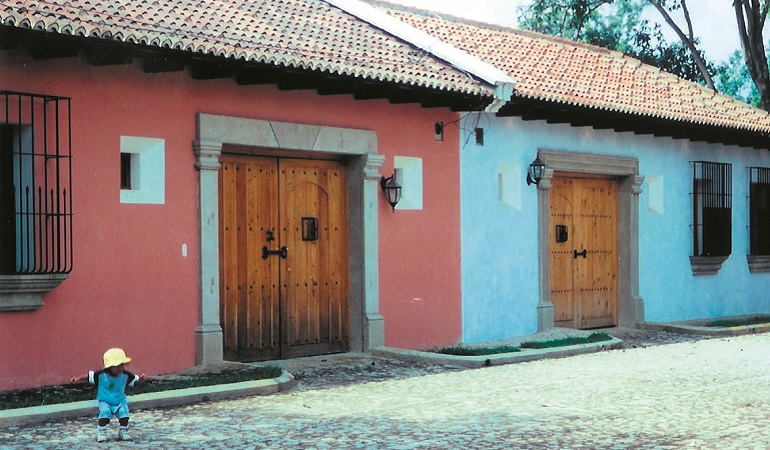Last night, I dreamed of Guatemala again: the blue sky framing volcanoes, the thunderous firecrackers declaring birthdays, the coffee plants, the cobblestone streets. It was a wonderful dream.
Now that I’m awake, Guatemala is harder to remember, even though we were there just last fall. And so I must write down everything I can recall about the two months we spent there fostering Wells. It is a story of and for our family.
Last year, on my 35th birthday, we received the call. My son’s birth mother was expecting again, and she wanted us to adopt the baby. At the time, she was seven months pregnant. Coincidentally, we had filed INS papers to adopt another child from Guatemala only days before. Almost immediately, I had our dossier finished, authenticated, and on its way to the Guatemalan embassy. Two months later, on Father’s Day, our new son was born. His name was Alberto, and we gave him his middle name, Wells.
By August, waiting for Alberto had become unbearable. In fact, the only thing worse was the thought of him waiting for us all alone—for who knows how long—in Guatemala. I desperately needed to be with my baby. I decided to move to Guatemala to foster Alberto until I could take him home. It was the only way to be with him. I made the travel plans, arranged for my law partner to take over my caseload—and ignored everyone who thought I was crazy. Two weeks later, my mother, our 5-year-old daughter, Lawson, and Luke, our 2-year-old Guatemalan-born son, were on our way to Central America.
Our first morning in Guatemala City, my attorney arranged for my son’s foster mother to drop off Alberto with his birth mother, Maria. From across the hotel lobby, we flew into each others arms, renewing the bond we had forged when Luke was born.
Luke had fallen asleep moments before Maria arrived. She was able to lie down with him, hold him, smell him, stroke his hair, kiss him, and love him—all the things I longed to do with the new baby. Recognizing our daughters need to play an important role, Maria met Lawson with open arms, hugging and kissing her. She kissed my mother, her son’s grandmother. She looked at pictures of our family. She held and kissed her youngest son, our Alberto Wells. She left saying thank you, kissing my tears, asking me to tell the boys how much she loves them.
La Vida Local
Driving to Antigua, the peaceful colonial city we’d call home for two months, my mother and I were giddy. In the past four hours, we had met with the attorney and the birth mother, converted our dollars to quetzals, taken Alberto to the pediatrician, and, with all three children, grocery-shopped at the Hiper Paiz. But that would be the easy part.
When we arrived at our house, we were surprised: The gate of the gated community was merely a chain, and construction was going on all around us. Water pressure was dribble, hot water didn’t exist, and the electricity went out every day.
Despite the inconveniences at home, Antigua was lovely. Every day, we walked nearly a mile into town to pick up our groceries and water at the market. We’d rest in Central Park. There, the colors, sounds, and smells surround you. One image sticks in my mind: a young Mayan woman carrying a baby on her back in a sling, a 2-year-old on her left hip, a basket filled with weavings on her head, and two dozen eggs in her right hand. The woman moved at such a quick pace that she passed me—and I had a stroller.
It’s amazing how children, such creatures of habit, adapt to new surroundings. It wasn’t long before my children played market. Carrying baskets on their heads, they offered me tortillas for dos quetzals. My daughter began throwing around terms like birth mother and adoption decree, while my 2-year-old-son replied, No, gracias. Lawson noticed the barefoot locals lugging baskets on their heads, as well as the homeless family who lived on the square. Explaining poverty to my children was—and continues to be—a challenge.
The Real World
Were we nervous about bringing our fair-skinned daughter to Guatemala? No. But I was nervous about bringing my 2-year-old son. I worried that he would throw one of his tantrums in public, and the locals would think I was stealing him. Fortunately, we never had a problem. For the most part, people were kind or indifferent.
Everyday life was draining. Hauling groceries and caring for three small children wore us out. The sound of construction woke us up at 5 a.m., and we fell asleep by 9 p.m. During the night, we woke to feed the baby and kill mosquitoes.
On the adoption front, we hit a few glitches. The Guatemalan Solicitor General’s Office (PGN) rejected our case twice because they wanted copies of documents instead of originals. Then, miraculously, our case was approved. Four-month-old Wells was on his way home. Finally.
Visions of Guatemala often drift through my mind: blind men using machetes to cut grass, vivid tapestries and huipiles (traditional blouses), children wearing shoes cut open at the toes to make room for growing feet, the contrast of wealth and poverty.
We went to Guatemala because we loved our son. Now it’s part of our history. Was fostering Alberto easy? No. Would I do it again? In a heartbeat.



